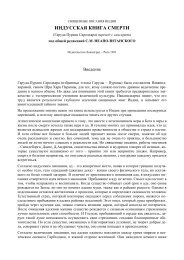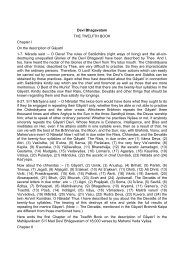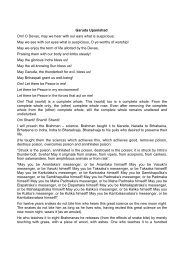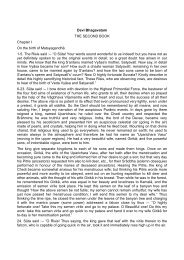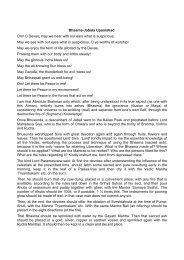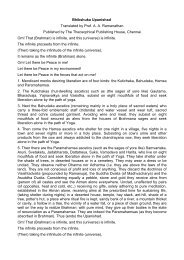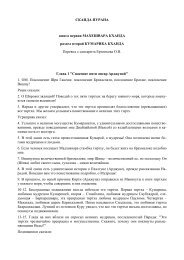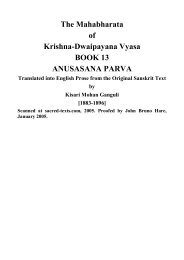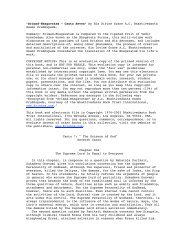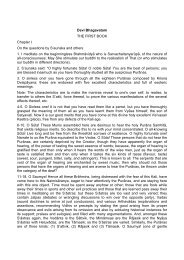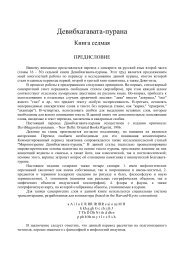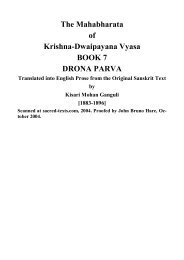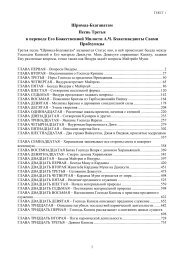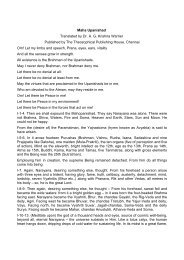Mahabharata 05 (eng)..
Mahabharata 05 (eng)..
Mahabharata 05 (eng)..
You also want an ePaper? Increase the reach of your titles
YUMPU automatically turns print PDFs into web optimized ePapers that Google loves.
UDYOGA PARAVA<br />
SECTION XXXIII<br />
man, and the anger of the impotent. These two persons never shine because of their incompatible<br />
acts, viz., a householder without exertion, and a beggar busied in schemes. These two, O king, live<br />
(as it were) in a region higher than heaven itself, viz., a man of power endued with forgiveness, and<br />
poor man that is charitable. Of things honestly got, these two must be looked upon as misuse, viz.,<br />
making gifts to the unworthy and refusing the worthy. These two should be thrown into the water,<br />
tightly binding weights to their necks, viz., a wealthy man that doth not give away, and a poor man<br />
that is proud. These two, O tiger among men, can pierce the orb itself of the sun, viz., a mendicant<br />
accomplished in yoga, and a warrior that hath fallen in open fight. O bull of the Bharata race, persons<br />
versed in the Vedas have said that men's means are good, middling, and bad. Men also, O king,<br />
are good, indifferent, and bad. They should, therefore, be respectively employed in that kind of<br />
work for which they may be fit. These three, O king, cannot have wealth of their own, viz., the wife,<br />
the slave, and the son, and whatever may be earned by them would be his to whom they belong.<br />
Great fear springeth from these three crimes, viz., theft of other's property, outrage on other's wives,<br />
and breach with friend. These three, besides, being destructive to one's own self, are the gates of<br />
hell, viz., lust, anger, and covetousness. Therefore, every one should renounce them. These three<br />
should never be forsaken even in imminent danger, viz., a follower, one who seeks protection, saying,<br />
– I am thine, – and lastly one who hath come to your abode. Verily, O Bharata, liberating a foe<br />
from distress, alone amounteth in point of merit, to these three taken together, viz., conferring a<br />
boon, acquiring a kingdom, and obtaining a son. Learned men have declared that a king, although<br />
powerful, should never consult with these four, viz., men of small sense, men that are procrastinating,<br />
men that are indolent, and men that are flatterers. O sire, crowned with prosperity and leading<br />
the life of a householder, let these four dwell with thee, viz., old consanguineous, relatives, highborn<br />
persons fallen into adversity, poor friends, and issueless sisters. On being asked by the chief of<br />
the celestials, Vrihaspati, O mighty king declared four things capable of fructifying or occurring<br />
within a single day, viz., the resolve of the gods, the comprehensions of intelligent persons, the humility<br />
of learned men, and the destruction of the sinful. These four that are calculated to remove<br />
fear, bring on fear when they are improperly performed, viz., the Agni-hotra, the vow of silence,<br />
study, and sacrifice (in general). O bull of the Bharata race, these five fires, should be worshipped<br />
with regard by a person, viz., father, mother, fire (proper), soul and preceptor. By serving these five,<br />
men attain great fame in this world, viz., the gods, the Pitris, men, beggars, and guests. These five<br />
follow thee wherever thou goest, viz., friends, foes, those that are indifferent, dependants, and those<br />
that are entitled to maintenance. Of the five senses beholding to man, if one springeth a leak, then<br />
from that single hole runneth out all his intelligence, even like water running out from a perforated<br />
leathern vessel. The six faults should be avoided by a person who wisheth to attain prosperity, viz.,<br />
sleep, drowsiness, fear, anger, indolence and procrastination. These six should be renounced like a<br />
splitting vessel in the sea, viz., a preceptor that cannot expound the scriptures, a priest that is illiterate,<br />
a king that is unable to protect, a wife that speaketh disagreeable words, a cow-herd that doth<br />
not wish to go to the fields, and a barber that wisheth to renounce a village for the woods. Verily,<br />
those six qualities should never be forsaken by men, viz., truth, charity, diligence, benevolence, forgiveness<br />
and patience. These six are instantly destroyed, if neglected, viz., kine, service, agriculture,<br />
a wife, learning, and the wealth of a Sudra. These six forget those who have bestowed obligations<br />
on them, viz., educated disciples, their preceptors; married persons, their mothers; persons whose<br />
desires have been gratified, women; they who have achieved success, they who had rendered aid;<br />
they who have crossed a river, the boat (that carried them over); and patients that have been cured,<br />
their physicians. Health, unindebtedness, living at home, companionship with good men, certainty<br />
as regards the means of livelihood, and living without fear, these six. O king, conduce to the happiness<br />
of men. These six are always miserable, viz., the envious, the malicious, the discontented, the<br />
irascible, the ever-suspicious, and those depending upon the fortunes of others. These six, O king,<br />
comprise the happiness of men, viz., acquirement of wealth, uninterrupted health, a beloved and a<br />
sweet-speeched wife, an obedient son, and knowledge that is lucrative. He that succeedeth in gaining<br />
the mastery over the six that are always present in the human heart, being thus the master of his<br />
senses, never committeth sin, and therefore suffereth calamity. These six may be seen to subsist<br />
44 Sacred-texts.com



